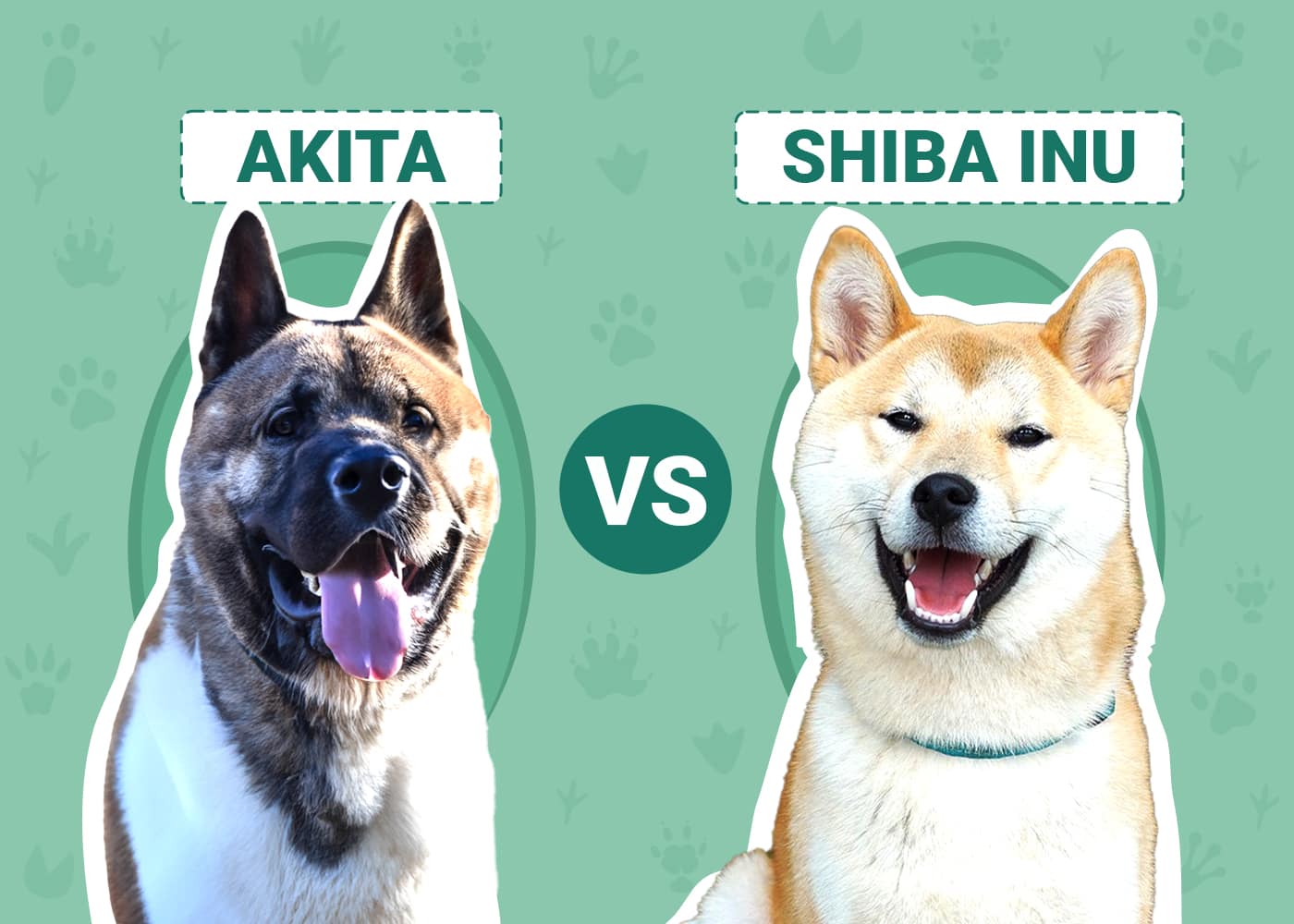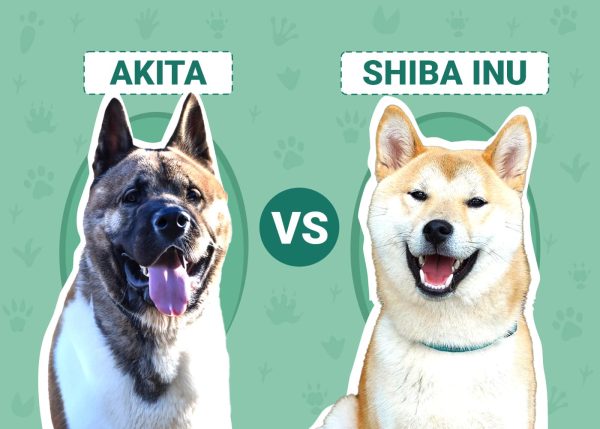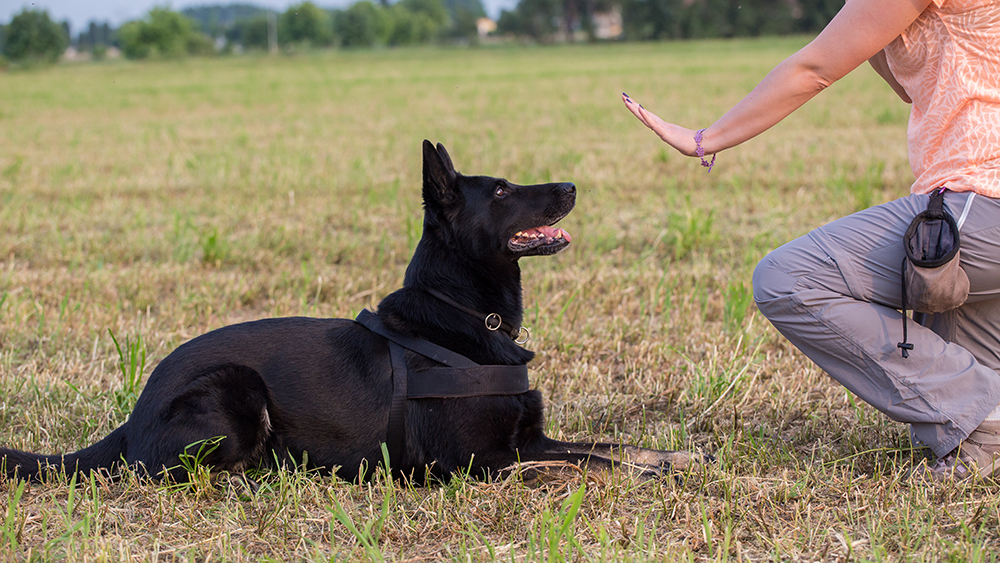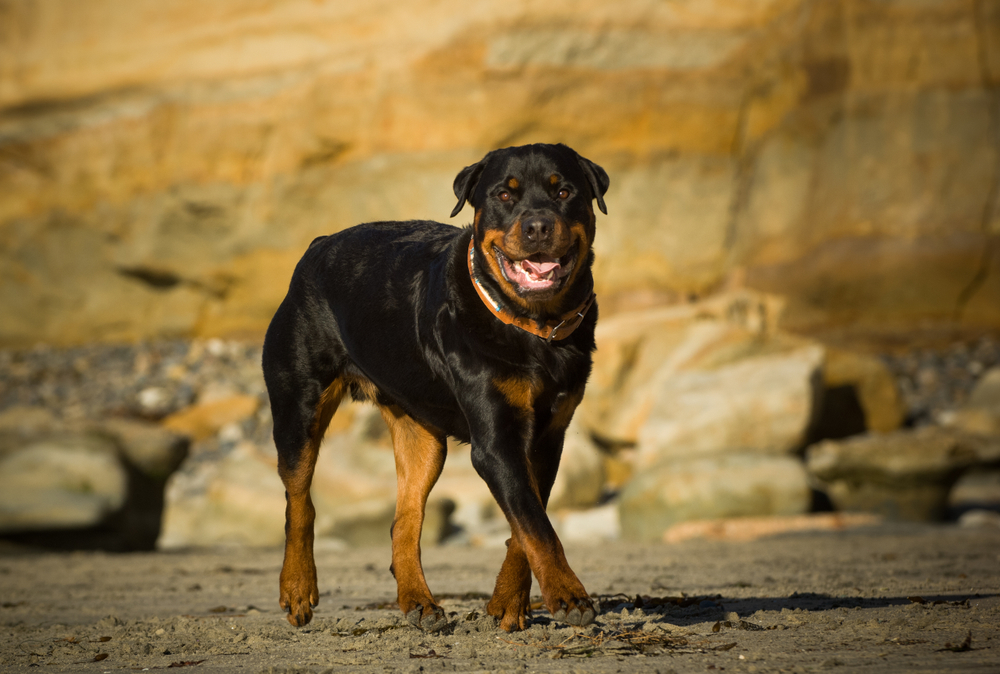Click to Skip Ahead
On the surface, Akitas and Shiba Inus are similar. They are muscular Japanese breeds bred to be diligent hunters. Likewise, they have adorable, triangle-shaped ears and curled tails that stand proudly at attention. However, with further examination, the differences can become more apparent. The most notable and immediate difference between the two breeds is their size; Akitas stand around 10 inches taller than Shiba Inus and are much heavier.
While there are many similarities between Akitas and Shiba Inus, there are plenty of differences as well. In this article, we’ll discuss each of these incredible breeds to provide more insight into the features they share and the features that make them stand out.
Visual Differences
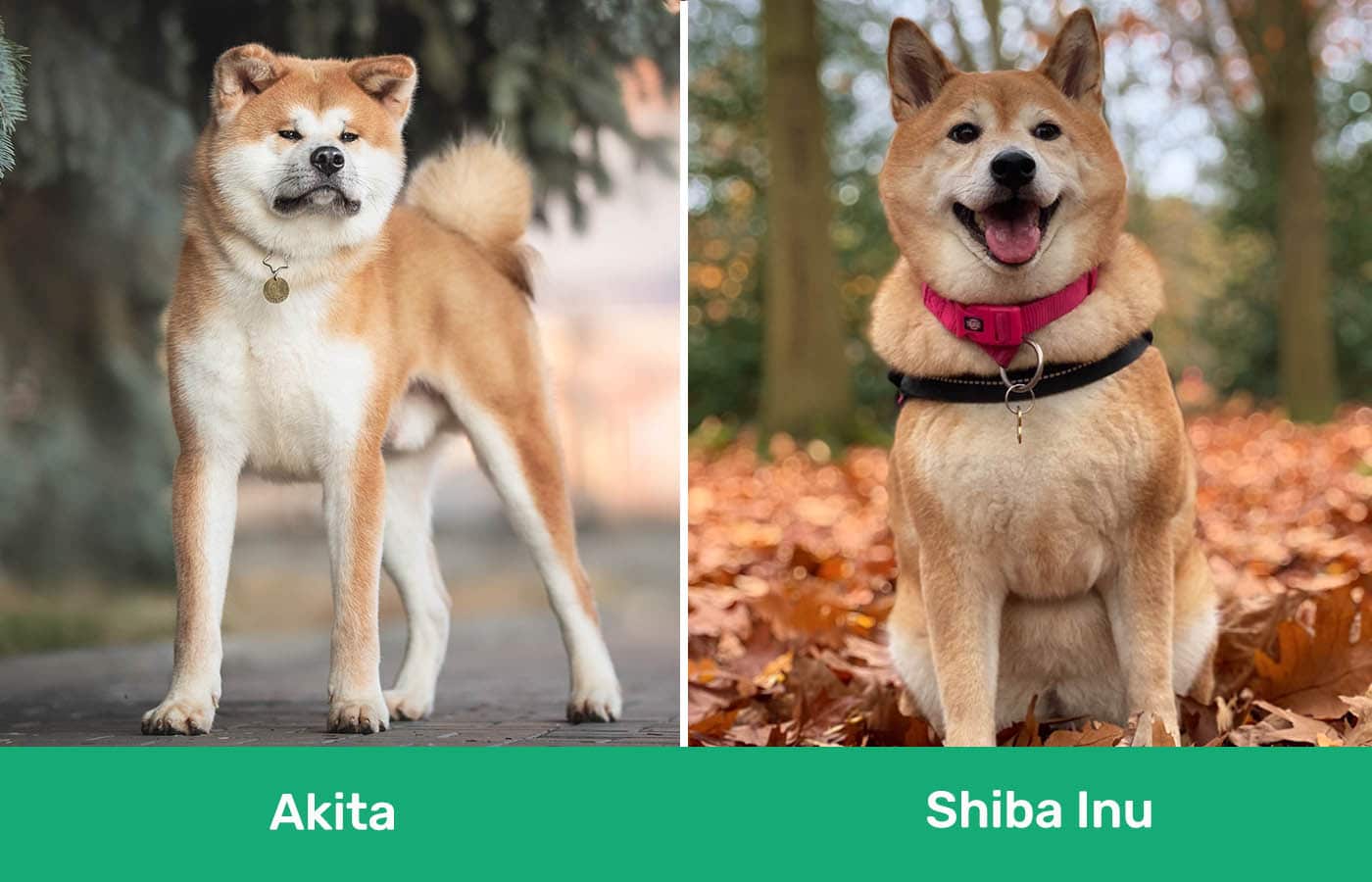
At a Glance
- Average height (adult): 26–28 inches
- Average weight (adult): 100–130 pounds
- Lifespan: 10–14 years
- Exercise: 1 hour per day
- Grooming needs: High maintenance
- Family-friendly: Moderately
- Other pet-friendly: Not recommended
- Trainability: Eager to please yet occasionally self-willed
- Average height (adult): 5–16.5 inches
- Average weight (adult): 23 pounds
- Lifespan: 13–16 years
- Exercise: 30 minutes per day
- Grooming needs: Low maintenance
- Family-friendly: Moderately
- Other pet-friendly: Moderately
- Trainability: Somewhat difficult
Akita Overview
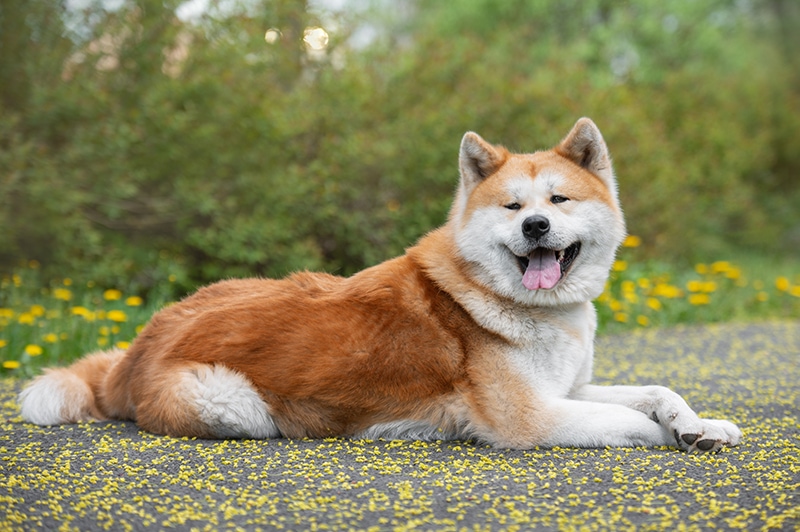
Akitas are muscular, burly dogs known for their imposing appearance. They are a large breed with a heavy-boned stature and a broad head, making them a force to be reckoned with. Not many people would willingly provoke the Akita since they stand nearly 30 inches tall and can easily intimidate intruders with their looks alone.
Personality/Character
Akitas are composed and courageous animals. They have high energy levels and a strong work ethic, which can be attributed to their origins as hunting dogs. In the early 17th century, Akitas were bred to hunt deer, wild boar, and bears. As a result of this dedicated breeding, the Akita is confident, fearless, and highly vigilant. They love their family and are protective of the home, so you can rest assured knowing that this loyal canine has your back.
Training
Regarding training, the Akita thrives best in a household where their owner is experienced. Since they are large, powerful canines, they must be properly trained. Without it, the Akita may dominate their owner since they can be independent and headstrong.
Akitas are highly intelligent and can quickly learn right from wrong from an owner experienced with large breeds. They benefit from consistent training that begins when they are young puppies.
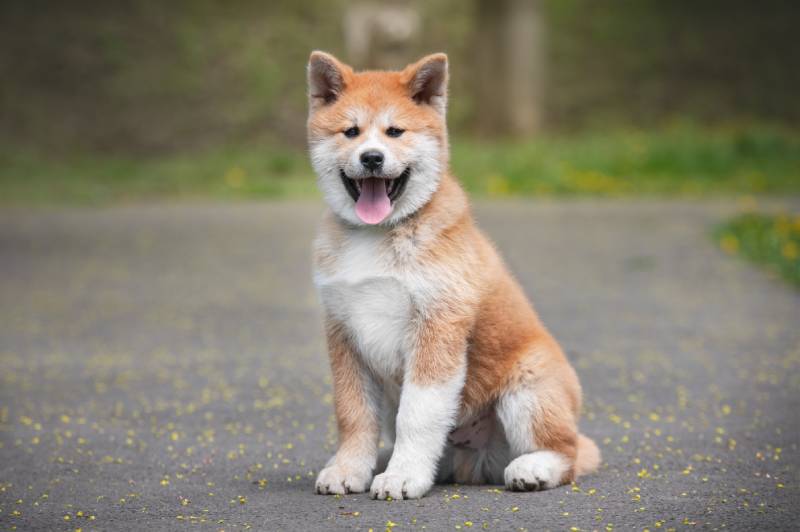
Health & Care
As a larger dog, the Akita can suffer from bloat. Bloat is a condition in which the stomach expands with gas, cutting off blood flow from the body. This condition can be sudden and life-threatening, so always make sure your Akita rests after eating a meal. Hip dysplasia is another issue that can affect Akitas. It occurs when the hip joints are formed incorrectly, which can lead to impaired mobility and pain.
For a larger breed dog, the Akita has a long lifespan and can live over 12 years. While there are conditions that the Akita is prone to developing, they are a relatively healthy breed.
Suitable For:
Akitas are an excellent choice for families looking for a guard dog. They are incredibly vigilant and loyal to their families, and they are excellent defenders of the home. They can be good family dogs under the right circumstances. They are moderately good with young children, although they are not recommended for households with other pets. Likewise, they are not recommended for first-time dog owners.
Active households are an excellent fit for Akitas since they require a good amount of exercise. However, they are not overly hyper dogs, so they are also good for people who like to relax inside occasionally.
Shiba Inu Overview
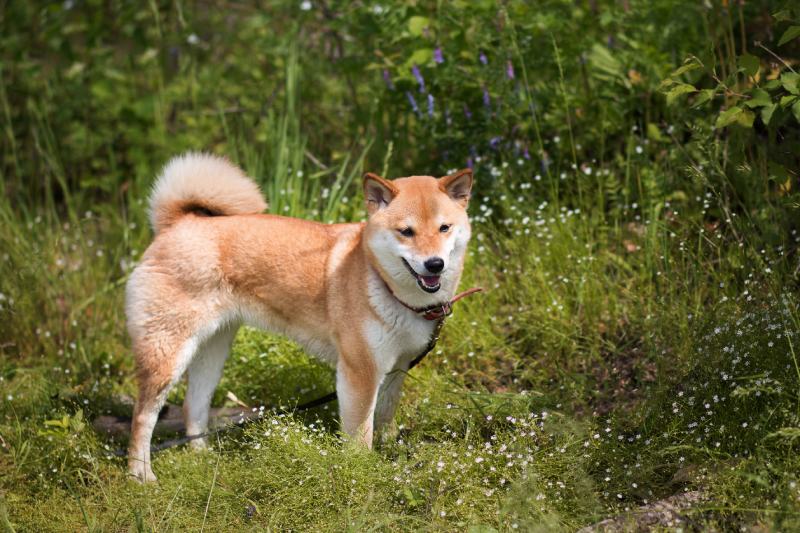
Shiba Inus are adaptable dogs. Despite their smaller size, they are sturdy and muscular. Their bravery can match the imposing Akita, and they have enough confidence to convince themselves that they are just as big of a dog.
Personality/Character
The Shiba Inu is a courageous, self-assured dog with keen alertness. Their vigilance makes them excellent guard dogs, but at the same time, their deep affection for their family members makes them great family pets.
When it comes to strangers, the Shiba Inu tends to be aloof. They can be indifferent and even cold towards people they don’t know, which has caused some people to describe them as cat-like. They are more vocal than Akitas but aren’t known for being needlessly loud.
Exercise
Shiba Inus are energetic dogs. They love to take walks with their favorite humans; however, they should never be allowed off their leashes if not in an enclosed area. Shiba Inus are known to bolt on a whim, and no amount of obedience training will ever change that. So, when exercising with your Shiba Inu, supervise them and ensure they remain on a leash.
Training
Shiba Inus cannot be trusted off their leashes, even with obedience training. However, that doesn’t mean that obedience training is useless. You should still enroll your Shiba Inu in puppy obedience classes and other forms of training to ensure that your dog behaves appropriately.
A benefit to Shiba Inus is that they are incredibly easy to housetrain. Some owners have even remarked that it seems as though the dogs were born with housetraining already in their genes.
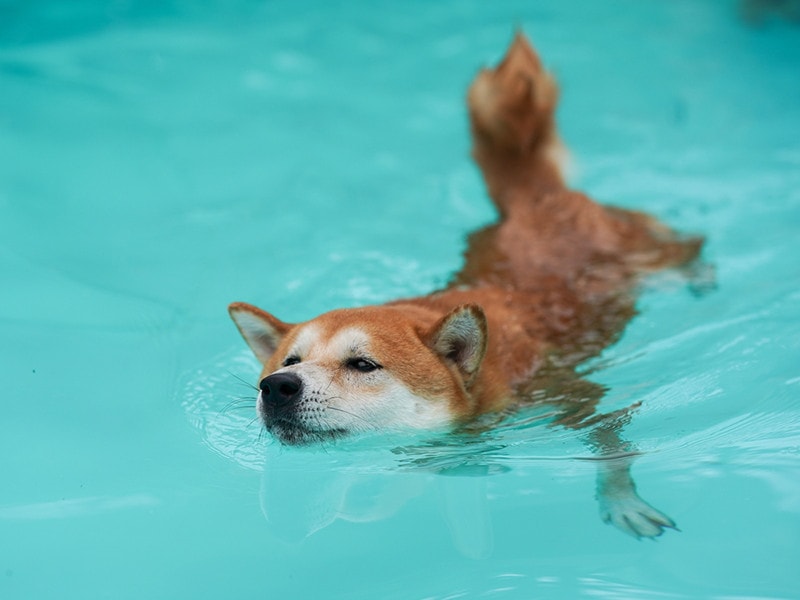
Health & Care
The most common issue that Shiba Inus face is allergies. However, they are also predisposed to joint issues such as hip dysplasia and patella luxation. Shiba Inus typically live longer than Akitas and can live as long as 16 years.
Suitable For:
As mentioned, Shiba Inus are highly adaptable. They can thrive in large estates or tiny apartments, and any home is suitable as long as it’s well-maintained. They are fine family pets and can get along moderately well with young children and other dogs. They are pretty self-willed dogs, so first-time dog owners are not recommended. Since they can escape easily, highly vigilant and responsible owners are best for the Shiba Inu.
Which Breed Is Right for You?
The Akita and the Shiba Inu are independent, intelligent, and courageous animals. Besides their size difference, they are fairly similar in appearance. They are also vigilant and loyal to their families, but they’re better for experienced dog owners than beginners.
However, there are some notable differences. Akitas are quieter and more reserved, whereas Shibas can be a bit louder and more willing to socialize with other animals. Both dogs make excellent pets for the right owners, and although they require extensive training, they’ll provide unconditional love and companionship.
See Also:
- Basenji vs. Shiba Inu: Differences Explained (With Pictures)
- Husky vs. Shiba Inu: Differences Explained (With Pictures)
Featured Image Credit to: (L) Olga Aniven, Shutterstock | (R) OlesyaNickolaeva, Shutterstock

